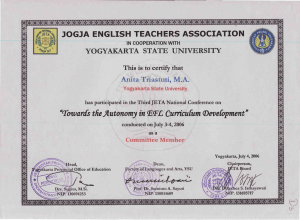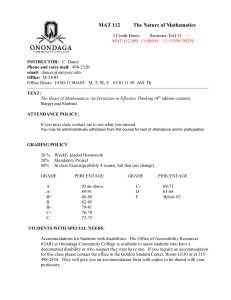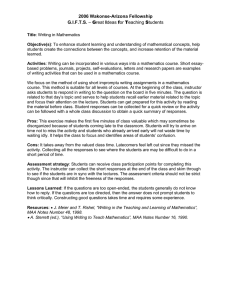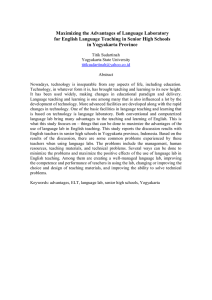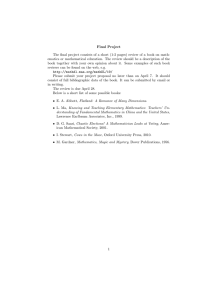YOGYAKARTA STATE UNIVERSITY FACULTY OF MATHEMATICS AND NATURAL SCIENCES
advertisement
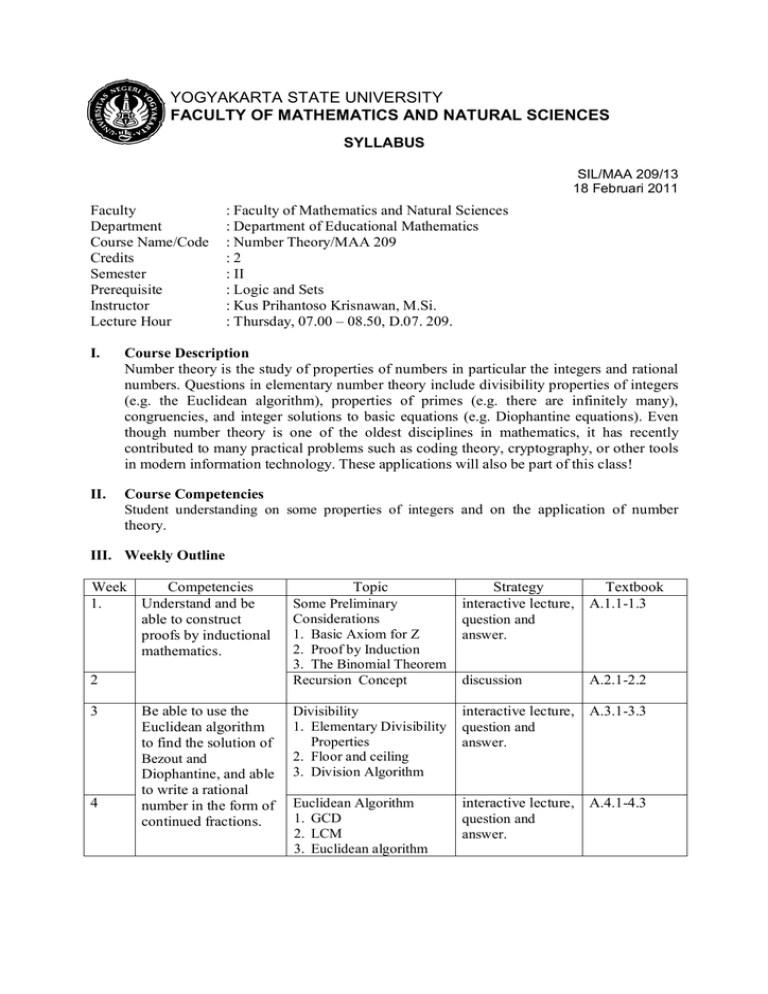
YOGYAKARTA STATE UNIVERSITY FACULTY OF MATHEMATICS AND NATURAL SCIENCES SYLLABUS SIL/MAA 209/13 18 Februari 2011 Faculty Department Course Name/Code Credits Semester Prerequisite Instructor Lecture Hour : Faculty of Mathematics and Natural Sciences : Department of Educational Mathematics : Number Theory/MAA 209 :2 : II : Logic and Sets : Kus Prihantoso Krisnawan, M.Si. : Thursday, 07.00 – 08.50, D.07. 209. I. Course Description Number theory is the study of properties of numbers in particular the integers and rational numbers. Questions in elementary number theory include divisibility properties of integers (e.g. the Euclidean algorithm), properties of primes (e.g. there are infinitely many), congruencies, and integer solutions to basic equations (e.g. Diophantine equations). Even though number theory is one of the oldest disciplines in mathematics, it has recently contributed to many practical problems such as coding theory, cryptography, or other tools in modern information technology. These applications will also be part of this class! II. Course Competencies Student understanding on some properties of integers and on the application of number theory. III. Weekly Outline Week Competencies 1. Understand and be able to construct proofs by inductional mathematics. 2 3 4 Be able to use the Euclidean algorithm to find the solution of Bezout and Diophantine, and able to write a rational number in the form of continued fractions. Topic Some Preliminary Considerations 1. Basic Axiom for Z 2. Proof by Induction 3. The Binomial Theorem Recursion Concept Strategy Textbook interactive lecture, A.1.1-1.3 question and answer. Divisibility 1. Elementary Divisibility Properties 2. Floor and ceiling 3. Division Algorithm interactive lecture, A.3.1-3.3 question and answer. Euclidean Algorithm 1. GCD 2. LCM 3. Euclidean algorithm interactive lecture, A.4.1-4.3 question and answer. discussion A.2.1-2.2 YOGYAKARTA STATE UNIVERSITY FACULTY OF MATHEMATICS AND NATURAL SCIENCES SYLLABUS SIL/MAA 209/13 18 Februari 2011 5 6 7-8 Understand how to count in a different base. 9 Understand the properties of primes. 10 Understand the properties of congruencies. Understand the properties of some special functions. Understand the properties of roots and indices. 11 12 13 14-16 IV Knowing and understanding the application of number theory. Applications of Euclidean Algorithm 1. Bezout Identity 2. Diophantine 3. Continued Fractions Midterm 1 Counting in Arbitrary Base 1. Positional Notation of Numbers 2. Base 2 and Its Operations 3. Base 8 4. Base 16 Primes 1. Prime Number 2. Prime Factorization Congruencies 1. Basic Properties 2. Linear Congruencies Number-Theoretic Functions Discussion A.4.4 Discussion 5.1-5.3 Primitive Roots and Indices interactive lecture, A.9.1-9.3 question and answer. Midterm 2 Additional topic 1. Nonlinear Diophantine 2. Cryptography 3. Elliptic Curve Final Exam interactive lecture, A.6.1-6.2 question and answer. interactive lecture, A.7.1-7.2 question and answer. Discussion A.8.1-8.3 Discussion A.10-12 Textbook and References A. Textbook Krisnawan, K.P. Handout of Number Theory. Yogyakarta State University. B. References 1. Baldoni, M.W., Ciliberto, C., and Cattaneo, G.M.P. 2009. Elementary Number Theory, Cryptography, and Codes. Springer-Verlag Berlin Heidelberg. 2. Burton, D.M. 1998. Elementary NumberTheory. Fourth edition. The McGraw-Hill Companies, Inc. 3. Clark, W.E. 2002. Elementary Number Theory. YOGYAKARTA STATE UNIVERSITY FACULTY OF MATHEMATICS AND NATURAL SCIENCES SYLLABUS SIL/MAA 209/13 18 Februari 2011 V 1 2 3 4 5 Grades will be calculated according to the following rubric: Class Participation Homework Midterm 1 Midterm 2 Final Exam 5% 15% 25% 25% 30% 100% Total Academic dishonesty, including cheating and plagiarism, will not be tolerated. Yogyakarta, February 2012 Instructor Kus Prihantoso K., M.Si NIP. 19790406 200501 1 005
